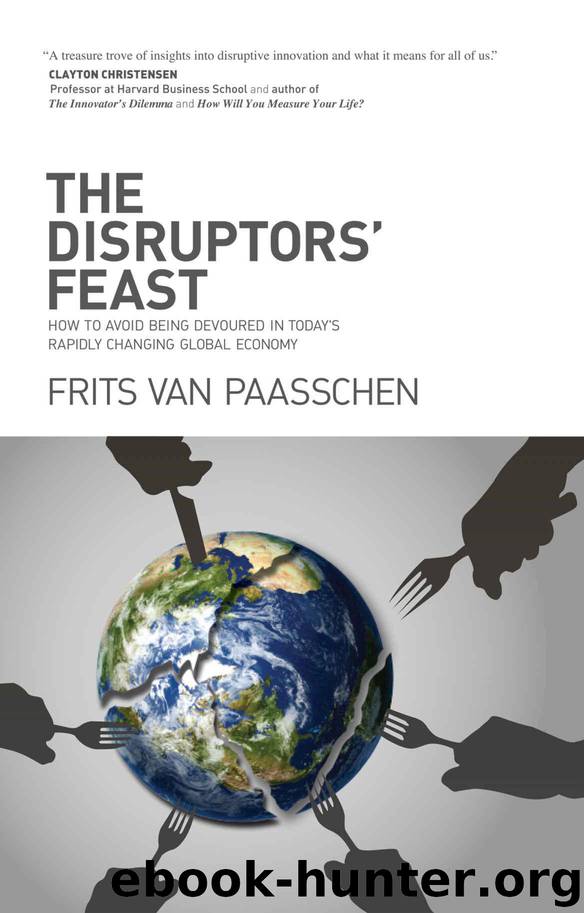The Disruptors' Feast: How to avoid being devoured in today's rapidly changing global economy by van Paasschen Frits

Author:van Paasschen, Frits
Language: eng
Format: azw
Published: 2017-01-11T16:00:00+00:00
GLOBAL INCOME GROWTH FROM 1988–2008
Data gathered from nearly 600 household surveys from
approximately 120 countries in the world, covering more
than 90% of the world population and 95% of global
GDP. A) The rising global middle class; B) The stagnating
rich-country middle class; C) The global super rich.
Source: Branko Milanovic, Global Inequality: A
New Approach for the Age of Globalization
EXTREME WEALTH
Rising wealth has contributed to income inequality within countries. This has created a paradox. More specifically, average wealth levels across nations are converging, while income gaps within countries are getting wider. At the extreme, a “lucky few” have become wildly rich in a winner-take-all economy. The world’s 85 wealthiest billionaires, for example, share as much net-worth as the bottom half of all humanity.9 The assets of the global top one percent are greater than the bottom 99 percent.10 The United States may be home to more billionaires than any other country, but three-fourths of the world’s billionaires live elsewhere.11 New York used to be the city with the most billionaires, but it is now second, behind Beijing. Next are Moscow, Hong Kong, London, Shanghai, Shenzhen, Mumbai, Hangzhou, Paris, and Istanbul.12 Between 2009 and 2020, the number of billionaires will have increased fourfold.13 14
Many billionaires have come from obscurity, and more often than not, their wealth is not inherited. Instead, they got rich through entrepreneurship and investing. Khalaf Ahmad Al-Habtoor, whose personal fortunes rose in parallel with Dubai, is one such person.
Every billionaire, of course, has their own unique story, but many seem to have outsized personalities and ambition. Wang Jianlin, the founder and Chairman of Wanda, was a military official who in less than 30 years became China’s largest landowner and was listed as Asia’s richest man, worth $35 billion.15 He became famous outside his home country with his $2.6 billion acquisition of AMC, America’s second-largest cinema operator, in 2012. He told me once of his plans to grow his hotel business outside of China. This meant, he said, looking me straight in the eye, buying a global hotel company worth about $11 billion. This just so happened to be Starwood’s market value at the time.
Touring one of Wanda’s hotels, I saw a series of private dining rooms, a prominent feature of high-end Chinese hotels. Away from watchful eyes, VIPs can relax at round tables and talk business—periodically getting up to clink glasses and drink expensive wines. Energetic networkers can play host to multiple dinners at once by moving from one room to the next.
In Wang’s hotel, each dining room was named for a Chinese dynasty, except the largest and most ornate room at the building’s corner. It was named Wang! Sometimes, though, the small things tell you the most. During a private lunch meeting in the United States, I watched Wang take a rather dull knife to slice a pear. After a couple of attempts, he dropped the knife in frustration and—as if to teach the fruit (and maybe me) a lesson—simply took a huge bite out of it.
Sheldon Adelson is another billionaire from modest origins.
Download
This site does not store any files on its server. We only index and link to content provided by other sites. Please contact the content providers to delete copyright contents if any and email us, we'll remove relevant links or contents immediately.
Life 3.0: Being Human in the Age of Artificial Intelligence by Tegmark Max(5558)
The Sports Rules Book by Human Kinetics(4388)
The Age of Surveillance Capitalism by Shoshana Zuboff(4293)
ACT Math For Dummies by Zegarelli Mark(4049)
Unlabel: Selling You Without Selling Out by Marc Ecko(3663)
Blood, Sweat, and Pixels by Jason Schreier(3624)
Hidden Persuasion: 33 psychological influence techniques in advertising by Marc Andrews & Matthijs van Leeuwen & Rick van Baaren(3565)
The Pixar Touch by David A. Price(3439)
Bad Pharma by Ben Goldacre(3428)
Urban Outlaw by Magnus Walker(3396)
Project Animal Farm: An Accidental Journey into the Secret World of Farming and the Truth About Our Food by Sonia Faruqi(3221)
Kitchen confidential by Anthony Bourdain(3090)
Brotopia by Emily Chang(3056)
Slugfest by Reed Tucker(3004)
The Content Trap by Bharat Anand(2927)
The Airbnb Story by Leigh Gallagher(2857)
Coffee for One by KJ Fallon(2636)
Smuggler's Cove: Exotic Cocktails, Rum, and the Cult of Tiki by Martin Cate & Rebecca Cate(2541)
Beer is proof God loves us by Charles W. Bamforth(2462)
